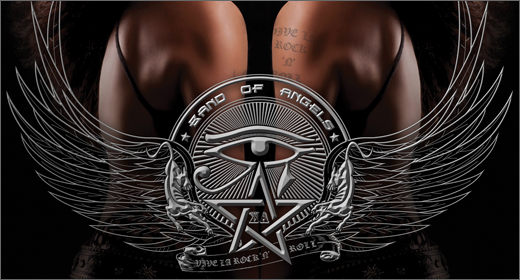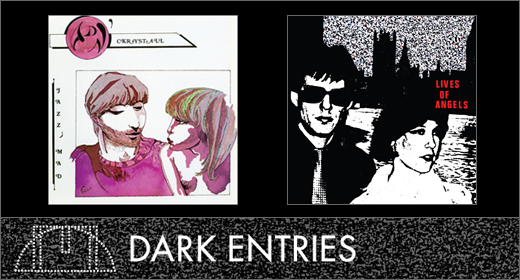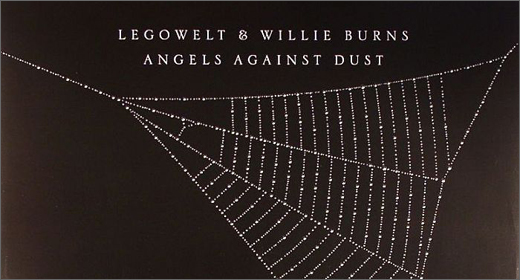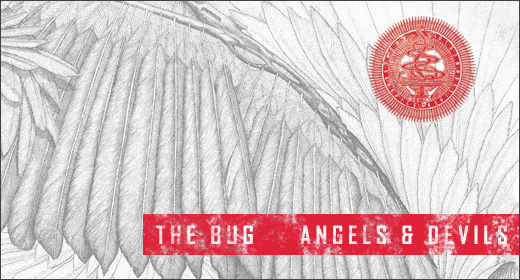As much as Kelli previously put her stamp on contemporary folk, wrapped pop music around her little finger and is frequently freelance songwriting with the big boys, for the first time Band Of Angels can only be described as a “Kelli Ali album.”
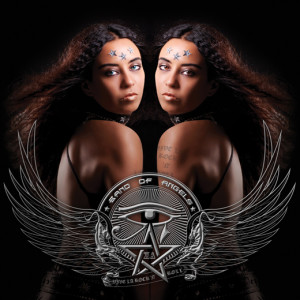 An artist who “re-invents” themselves at every given opportunity is a pretty standard claim these days, and usually actually means little more than hopping on a current bandwagon or adding a watered down dubstep wobble on one or two of their album tracks—especially in the world of more commercially prolific pop artists. So it’s refreshing when one genuinely throws caution to the wind and dives head-first into a whole new genre for an entire project or album. On the plus side it means that no two albums will ever feel the same and will always surprise. However such change risks accusations of never really offering conviction or carving a “sound” of their own. In fairness, the solo output of Kelli Ali (the former front-woman of 90s trip-hop darlings the Sneaker Pimps) has been accused of both these pros and cons in the 15 years since jealousy and a clash of egos saw the boys in the band infamously gave her the sack, much to their own detriment. But amidst her discreetly prolific and surprisingly high profiled collaborations and cult-pleasing solo albums, it would appear that Kelli Ali has been biding her time by adding feathers in her cap and strings to her bow in order to prove that she was just more than the voice and face of another man’s ego.
An artist who “re-invents” themselves at every given opportunity is a pretty standard claim these days, and usually actually means little more than hopping on a current bandwagon or adding a watered down dubstep wobble on one or two of their album tracks—especially in the world of more commercially prolific pop artists. So it’s refreshing when one genuinely throws caution to the wind and dives head-first into a whole new genre for an entire project or album. On the plus side it means that no two albums will ever feel the same and will always surprise. However such change risks accusations of never really offering conviction or carving a “sound” of their own. In fairness, the solo output of Kelli Ali (the former front-woman of 90s trip-hop darlings the Sneaker Pimps) has been accused of both these pros and cons in the 15 years since jealousy and a clash of egos saw the boys in the band infamously gave her the sack, much to their own detriment. But amidst her discreetly prolific and surprisingly high profiled collaborations and cult-pleasing solo albums, it would appear that Kelli Ali has been biding her time by adding feathers in her cap and strings to her bow in order to prove that she was just more than the voice and face of another man’s ego.
While her initial post Becoming X solo albums Tigermouth (2003) and Psychic Cat (2004) were an expected bid for more mainstream pop success, neither album exactly set the world on fire (despite some moments of highly refined pop that even Kylie Minogue would trade her gold hotpants for). What did shine through though was what a slick, punchy and talented songwriter that Kelli Ali was—something that the likes of Marc Almond and Paul Oakenfold took advantage of, and made room for Kelli’s appearances on tracks by Linkin Park, house pioneer Satoshi Tomiie, soul legend Bootsy Collins, and even a support slot on Garbage’s 2004 world tour. As notable as all these names are, a common thread or genre was still possibly missing to those not familiar with Kelli’s gradual switch to saccharine birdsong from that snarly, hazy angst that gave Becoming X its venom.
While another genre swap was perhaps to be expected, taking three years to gently mould an authentic folk music anthology in 2008 entitled Rocking Horse (with Vashti Bunyan’s comeback producer, Max Richter) was perhaps the last thing anyone expected. Fortunately, it charmed its way through the critics and finally gave Kelli the “solo artist” credibility she’d been working for. Concerns about Kelli’s commitment to her new found respect for tradition were quickly put to bed when she took the literary works of Mary Shelly, brought forth her choral soprano and layered original works over the incredible neo-classical compositions of Swiss pianist Ozymandias on the 2010 side-project album, A Paradise Inhabited By Devils. With such concerted efforts in the acoustic arenas finally giving Kelli Ali a level playing field, surely one more left turn would unravel all that hard work? For any other artist, yes it probably would have. But when you use the opportunity of your fifth solo album to finally relinquish the security of your long-standing record label (One Little Indian) in favor of a fan-base orientated crowd-funding platform in order to take full control of the album, then perhaps it’s time to really expected the unexpected?
While Band Of Angels is neither folk, acoustic or choral, the raw principles and respectable finesse of her last two projects have given Kelli a sharper edge when it comes to her outlook on what makes a contemporary pop album. Not only this, but it has also seemingly brought her to a similar personal epiphany that Björk may have been at when she made the ground-braking Homogenic, when PJ Harvey made Is This Desire? or even when Radiohead made Kid A (to a lesser degree). ie: That strangely logical point when the allure of more sophisticated Electronic production and its unlimited possibilities is what it will take to bring well developed songwriting and new arrangements to whole other levels. Band Of Angels is not the smack in the face statement that its premise threatens it to be. But rather a natural and subtle full circle that has been been given the opportunity to spiral upwards through old lessons being viewed through wiser eyes, and realized through clever collaborations with some fine electronic and production talent such as Jilk, Martin Phone, Kindle, MOTOR, Cult With No Name and producer Luke Buttery.
Opening with the clockwork and drones of “The Art Of Love,” Martin Phone provides a brooding start with Kelli in her finest birdsong. Kelli’s voice makes way for a dramatic early highlight when the song literally collapses in on itself through a momentary barrage of double-time, death-metal kick drums and bass explosions, ushering in a brief moment of otherworldly soprano washed in strings and impressive sub bass before the song kicks back into life through a delicate chorus, haunting piano lines and rhythmic glitchy electronics. It’s a powerful and impressive start that second track “The Hunter” capitalizes on fully by upping the momentum slightly with its sparkly, shiny galloping beats and harps, as Kelli gives even Bat For Lashes’ poppier moments a run for her money. “Silent Requiem” returns to more brooding terrain and pulls out the powerful drums and string arrangements over a relentless pulse that continues to build and build, before “Kiss Me Cleopatra” offers a break from the tension by drawing on Kelli’s dabbles with more commercial dance music for the album’s token “floor filler.” With a lyrical focus on gender politics and sexual ambiguity and Kelli returning to a more old-school breathy and brash delivery, what could have ended up as a run-of-the-mill dated house track is purposely taken down a dirty, hazy, retro electro route courtesy of MOTOR. While it’s certainly the album’s token sore thumb in terms of style, its inclusion is a necessary tangent back to Kelli’s solo artist pop / dance roots that will keep her earlier fans happy and offers the album a fun, well timed pit-stop.
As a dusty piano intro opens “Falling,” an epic wash of cut & pasted insect-like IDM by Jilk works effortlessly around bulging strings, harps and basslines as Kelli soars while revealing a tale about an angel falling from grace. That hazy, retro vibe is brought back and turned inside out as Kelli teams up with Kindle on “In The House Of Love” for an eerie, pounding duet that could well be a lost Joy Division track in terms of its well timed arrangements and spiky atmosphere. As we’re swiftly carried deeper into the album’s flipside, “Fear My Shepherd” offers another detour in the form of a tender hymn about conquering ones demons. On any other “pop” album, this would be the token soppy ballad. But within the context of the album, the twee plinky-plonky moments of manipulated piano which tip toe over the synths, strings and harps achieve the prayer like feel Kelli was aiming for. Not one you’d likely skip to by choice often, but it offers a well written and inoffensive thematic respite when blended into the album’s collective whole. The stubborn fuzz and haze of “When Darkness Falls” brews next, pacing its moody, dense electro in such a way that allows Kelli to burst through with an almighty earworm of a chorus, while resurrecting a few welcome, 90s Becoming X flashbacks. While certainly one of the album’s more angular tracks, it’s a grower that insists a repeat listen. The album’s title track returns to the lighter, ballad terrain but unleashes the power of Kelli’s knack for a brilliantly poetic lyric about recruiting personal saviours, as UK indie balladeers Cult With No Name provide the basis of a delicate piano, strings and harp backing which pays homage to Kelli’s previous affairs within more acoustic “singer/songwriter” circles.
Speaking of Cult With No Name collaborations, the 8-minute grand finale “Eternity” unfolds a long introduction of synthesizers and strings before a sharp, rhythmic swelling beat carries the swooping strings and Kelli’s romantic vocals through a whole journey within itself. The welcome extended cello outro takes centre stage in the final third and takes “Eternity” into politely grittier terrain without ever letting the beauty drop until the track itself does with one last exhale. As great pop album closers go, it’s up there with any that Kate Bush has delivered over the years. After a tight 10 tracks and exactly 46 minutes, Band Of Angels has effortlessly carried you from start to finish. While some of those aforementioned pit-stop tracks may work better in context of the entire start-to-finish album, their inclusion only strengthens what a digestible body of work Band Of Angels is in the digital age of “shuffle.”
Is Band Of Angels a “pop” album? An “alternative” album? An “electronic” album? Yes to all. But after all, people have been asking the same question about Björk’s albums since the 90s, and even now they can still only really be described as “Björk albums.” As much as Kelli previously put her stamp on contemporary folk, wrapped pop music around her little finger and is frequently freelance songwriting with the big boys, for the first time Band Of Angels can only be described as a “Kelli Ali album.” The genre, the tools, the strings or the Protools don’t command or label the output, they are just different lubricants for a bespoke, idiosyncratic patchwork blanket of ideas now, even if it openly leans on pop sensibilities for security at times. But where’s the harm in that? 17 years ago Kelli gave a voice to the lines “Overground, watch this space / I’m open to falling from grace”. But Kelli’s words and vision are her own now, and she’s far from falling.
Band Of Angels is available here.






